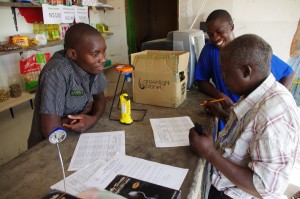Martin Luther King, Jr. said, “Darkness cannot drive out darkness; only light can do that.” Light, and pro bono service, we’d like to add. This week, The PBEye spied a pro bono empowered initiative, Elephant Energy, that quite literally drives out darkness from rural villages across Namibia by distributing sustainable energy technologies.

Namibia lacks the resources to meet the energy needs of its rural population. Daily livelihood activities are rendered unsafe, inefficient, or even impossible without electricity. For example, between 1.3 and 1.6 million women and children die worldwide each year as a result of air pollution caused by smoke inhalation from cooking fires. For the foreseeable future, approximately one million rural Namibians residing outside the nation’s power grid will continue to live without electricity every single day.
So, when attorney Douglas Vilsack – son of U.S. Secretary of Agriculture Tom Vilsack – announced his intention to tackle Namibia’s rural energy crisis, his former law school classmate, Kilpatrick Townsend and Stockton LLP* Associate Karam Saab, promptly boarded a plane for southern Africa. Saab spent two weeks investing his legal skills, pro bono, to help Vilsack set up Elephant Energy as a nonprofit trust in the town of Katima Mulilo. After studying Namibia’s business laws and consulting with other local social entrepreneurs, Saab and Vilsack concluded that the best available course of action was to establish a for-profit company, and then feed its profits into the nonprofit entity.
The appropriate sustainable energy technologies (ASETs) that Elephant Energy distributes make livelihood activities easier, safer, and more efficient for rural Namibians. Energy efficient cook stoves reduce emissions. Solar-powered lights increase the number of hours available in a day for reading, craft-making, vocational activities, or schoolchildren’s homework. And, the lights’ solar-charges enable villagers to charge cell phones and maintain contact with family members. Villagers accustomed to spending $7.00 every month on candles and kerosene can now purchase a range of solar-powered lights for between $10.00 and $30.00 each. The units produce up to four hours of light per solar charge, requiring only a replacement battery every three to five years. Saab told The PBEye, “Such a small investment can make a big difference in people’s lives.”
NGOs, like Elephant Energy, that work to alleviate extreme poverty and suffering are cropping up in every corner of the globe. Providing general legal support to emerging social enterprises is a richly rewarding way to use pro bono to improve the lives of some of the world’s most vulnerable and marginalized people. According to Vilsack, global pro bono is also good for business:
It’s very important for lawyers to establish connections with people in the developing world. When people like Karam Saab gain an understanding of what it’s like on the ground in places like Namibia, it makes it easier for companies to do business there. Law firms need to develop an understanding of these countries, and who they can go to, in order to competently advise businesses that want to enter these emerging markets. In order for social entrepreneurs to do this good work, pro bono lawyers need to do their part.
Saab’s pro bono support is empowering Elephant Energy to actualize its vision for rural Namibians of “Light in every home, clean air in every kitchen, power in every hand.”

Law Firm Pro Bono Challenge® Signatory, Kilpatrick Townsend & Stockton LLP* has adopted the maxim, “We are lawyers. Some of our best work isn’t billable.” Saab, an intellectual property and patent attorney with the firm’s Denver office, took his pro bono responsibilities to heart . . . and then, all the way to Namibia. “People around the office have heard that I’m doing this [global pro bono] work,” said Saab, “and they’re asking how they can get involved. I see pro bono overseas as an opportunity to make perhaps an even greater impact on people’s lives than is possible in the U.S.”
For assistance incorporating a global element into your firm or legal department’s pro bono scheme, contact Global Pro Bono Project Coordinator Julia Alanen. Or, embark on a virtual world tour using PBI’s Global Pro Bono Atlas to explore pro bono practices and opportunities abroad.
*denotes a Signatory to the Law Firm Pro Bono Challenge®

